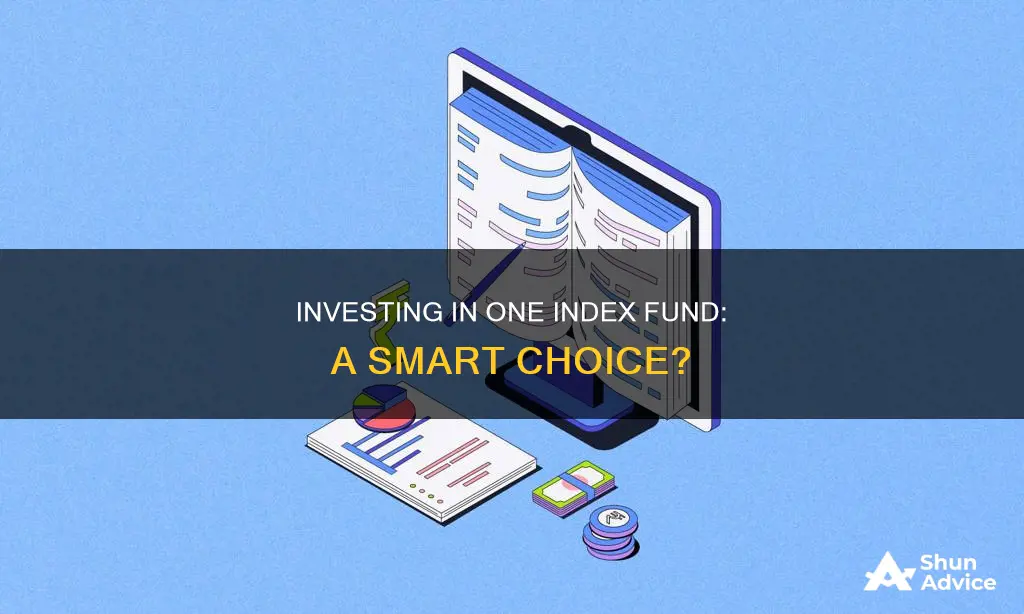
Index funds are a popular investment choice, especially for beginners, due to their low costs, diversification, and long-term performance. They are a type of mutual fund or exchange-traded fund (ETF) that tracks a specific market index, such as the S&P 500 or the Nasdaq Composite.
When considering whether to invest in a single index fund or multiple index funds, it is important to understand the benefits and drawbacks of each approach. Investing in a single index fund offers simplicity and ease of management, while investing in multiple index funds can provide greater diversification and the ability to customize your portfolio according to specific goals or market sectors.
One of the key advantages of index funds is their low cost. They have lower management fees compared to actively managed funds because they passively track an index without the need for active trading decisions. This passive management strategy also results in lower transaction costs, as index funds buy and sell securities less frequently.
Additionally, index funds offer broad diversification, which reduces investment risk. By investing in a single index fund, you gain exposure to a diverse range of securities within that index, which can help minimize the impact of individual stock volatility on your portfolio.
However, some investors choose to invest in multiple index funds to further diversify their portfolio and gain exposure to different market sectors or investment strategies. For example, you could invest in an S&P 500 index fund for large U.S. stocks and a separate index fund for international stocks or bonds.
When deciding whether to invest in a single or multiple index funds, it is essential to consider your investment goals, risk tolerance, and the level of complexity you are comfortable with. Additionally, it is crucial to compare the expense ratios and performance of different index funds to make informed decisions.
In conclusion, whether you choose to invest in a single index fund or multiple index funds depends on your personal preferences, investment strategy, and financial objectives. Both approaches can be effective ways to build wealth over the long term, and it is important to remember that diversification and low costs are key advantages of index funds.
| Characteristics | Values |
|---|---|
| Risk | Lower risk due to diversification |
| Returns | Average annual return for the S&P 500 is around 10% over the long term |
| Management | Passive management strategy, no active decision-making required |
| Costs | Low fees and expense ratios |
| Taxes | More tax-efficient than other investments |
| Access | Accessible to regular investors |
| Performance | Generally outperform other types of mutual funds |
What You'll Learn
- Index funds are a low-cost, beginner-friendly investment option
- They are a passive investment strategy that tracks a market index
- Index funds are highly diversified, reducing risk
- They offer broad exposure to the market and immediate diversification
- Index funds have tax advantages and lower transaction costs

Index funds are a low-cost, beginner-friendly investment option
One of the key advantages of index funds is their diversification. By investing in an index fund, you gain exposure to a broad range of securities within the index, reducing the risk associated with investing in individual stocks. This diversification also helps to smooth out volatility and provide more consistent returns over time. Additionally, index funds offer immediate diversification, as a single share of an index fund can provide ownership in hundreds of companies.
Another benefit of index funds is their low-cost structure. They generally have much lower management fees than actively managed funds because they do not require a manager to actively trade or a research team to analyse securities. Index funds also benefit from lower transaction costs since they hold investments for the long term and trade less frequently. These lower costs can significantly improve investment returns, especially over an extended period.
When considering investing in index funds, it is important to evaluate the expense ratios and management costs associated with different funds. Even small differences in fees can impact your long-term investment returns. Additionally, it is worth noting that some index funds may have investment minimums or account minimums, so it is essential to review the requirements before investing.
Overall, index funds offer a low-cost, beginner-friendly investment option that provides broad market exposure and diversification. They are a passive investment strategy that can be an excellent choice for investors seeking long-term wealth accumulation without the need for active management.
A Beginner's Guide to Low-Cost Index Fund Investing
You may want to see also

They are a passive investment strategy that tracks a market index
Index funds are a passive investment strategy that tracks a market index. They are a type of mutual fund or exchange-traded fund (ETF) that holds a selection of securities in a specific index, aiming to match its performance. The funds are passively managed, meaning they don't require active decision-making on which investments to buy or sell. Instead, they aim to replicate the performance of a chosen market index.
Index funds are designed to be a low-cost investment option, with lower management fees compared to other actively managed funds. The funds have a broad diversification of securities, reducing the risk of loss. They are also tax-efficient, as they generate less taxable income and can choose from various lots when selling securities to minimise capital gains taxes.
When choosing an index fund, it is important to consider the index it tracks, the fund's costs, and whether it meets your investment objectives. Some common benchmarks for index funds include the S&P 500, Dow Jones Industrial Average, Nasdaq Composite, and Russell 2000 Index.
While index funds offer a simple and low-cost way to invest, they also have some drawbacks. One of the main disadvantages is that they rise and fall with the market index they track, so investors are completely exposed to market downturns. Additionally, the diversification of index funds may limit the potential for higher returns compared to more targeted portfolios.
Monthly Mutual Fund Payments: A Smart Investment Strategy
You may want to see also

Index funds are highly diversified, reducing risk
Index funds are often comprised of hundreds of stocks, making it impossible for the average investor to purchase all of them individually. By pooling money from thousands of investors, exchange-traded funds (ETFs) and mutual funds are able to buy all the stocks within an index. As a result, investors who buy shares of an index fund own a small portion of every stock in the index.
The diversification offered by index funds reduces risk and makes it less likely for investors to lose money. While individual stocks may rise and fall, indexes tend to rise over time. The S&P 500, for example, has posted an average annual return of about 10% since 1928.
Because index funds are diversified across a wide range of stocks, they are less risky than owning a few individual stocks. If a single company performs poorly, it will have a minimal impact on the index fund as a whole. This diversification also means that an index fund will usually fluctuate less than an individual stock.
In addition to reducing risk, index funds offer other benefits such as attractive returns, low costs, and tax efficiency. They are a simple and cost-effective way for investors, especially beginners, to gain exposure to a broad, diversified portfolio.
Index Funds: Understanding Their Typical Investment Strategies
You may want to see also

They offer broad exposure to the market and immediate diversification
Index funds are a great way to get broad exposure to the market. They are a type of investment fund, either a mutual fund or an exchange-traded fund (ETF), that is based on a preset basket of stocks or an index. The fund managers of index funds aim to replicate the performance of the index without actively managing it. This means that they are passively managed and tend to have lower fees than actively managed funds.
Index funds provide investors with broad exposure to the market by tracking popular indexes that are often referenced in financial news as indicators of overall market performance. For example, the S&P 500, which includes 500 of the top companies in the US stock market, is one of the most widely followed indexes and is tracked by many index funds. By investing in an S&P 500 index fund, investors gain exposure to a diverse range of companies across different sectors and industries.
Another way that index funds offer broad exposure to the market is through their diversification benefits. Index funds provide immediate diversification, allowing investors to own a wide variety of stocks with a single purchase. For instance, an index fund based on the S&P 500 provides ownership in hundreds of companies across different sectors, while a Nasdaq-100 index fund offers exposure to about 100 companies, primarily in the technology sector.
Index funds also offer broad exposure to the market through their low costs. Because index funds are passively managed, they tend to have lower fees than actively managed funds, which need to pay for analysts and portfolio managers. Lower fees mean that a larger portion of the fund's returns goes to the investor. This makes index funds an attractive option for investors looking for broad market exposure at a low cost.
Overall, index funds offer broad exposure to the market by tracking popular indexes, providing immediate diversification, and having lower fees compared to actively managed funds. They are a great option for investors who want to invest in a diverse range of companies and sectors without having to actively manage their portfolio or pay high fees.
A Beginner's Guide to Mutual Funds in Pakistan
You may want to see also

Index funds have tax advantages and lower transaction costs
Index funds are known for their tax advantages and low transaction costs.
Index funds are considered more tax-efficient than other investment funds. They are designed to incur fewer taxable events, which can minimise tax liabilities for investors. For example, unlike mutual funds, index funds are structured so that investors are usually not exposed to capital gains on any individual security in the fund. This is because fund managers accommodate investment inflows and outflows by creating or redeeming "creation units", or baskets of assets, rather than by selling securities. As a result, index funds tend to distribute fewer capital gains to investors, which can reduce an investor's tax bill.
Index funds also tend to have lower expense ratios than actively managed funds. This is because they are passively managed, meaning they don't require a team of analysts to research and select stocks. Index funds simply replicate the performance of a chosen market index, so they have lower trading costs and generally don't need to pay analysts' salaries. This means that investors are charged lower fees.
Index funds are also associated with lower transaction costs. Actively managed funds tend to have higher transaction costs because they trade holdings more frequently. Index funds, on the other hand, are designed to trade as little as possible to keep costs down.
Finally, index funds can be purchased directly from a mutual fund company or a brokerage, or on an exchange-traded fund (ETF). ETFs are like mini mutual funds that trade like stocks throughout the day. This means that investors can often purchase index funds with low or no transaction fees.
Mutual Funds and Investment Trusts: What's the Difference?
You may want to see also
Frequently asked questions
Index funds are a low-cost, easy way to build wealth. They are a great investment for building wealth over the long term, which is why they're popular with retirement investors. They are also highly diversified, lowering the risk of losing money.
A portfolio that rises with its index falls with its index. If your fund tracks the S&P 500, for example, you will be vulnerable when the market drops. Diversification can also limit the upside of your investment.
An index fund is a type of mutual fund or exchange-traded fund (ETF) that holds all (or a representative sample) of the securities in a specific index, with the goal of matching the performance of that benchmark. The S&P 500 is perhaps the most well-known index.
You can invest in index funds by opening and funding a brokerage account. All brokers allow you to buy shares of ETFs on the open market, and most allow you to directly invest in mutual funds. You can also open an account directly with a mutual fund company that offers an index fund you're interested in.







